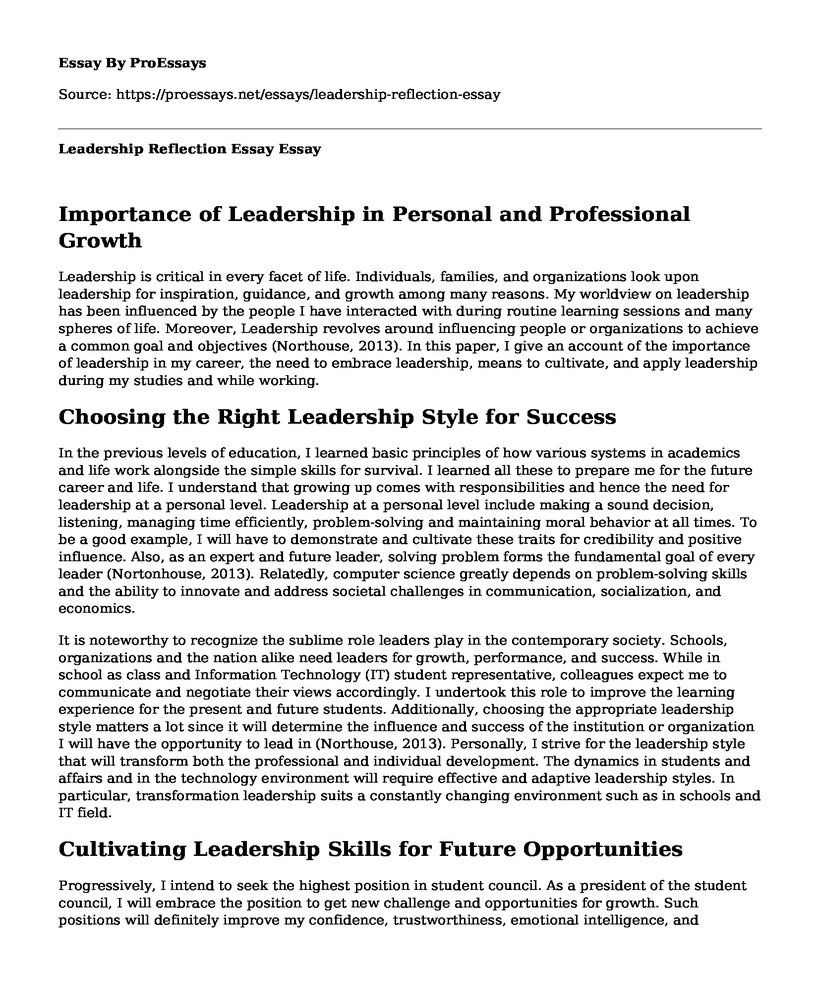Importance of Leadership in Personal and Professional Growth
Leadership is critical in every facet of life. Individuals, families, and organizations look upon leadership for inspiration, guidance, and growth among many reasons. My worldview on leadership has been influenced by the people I have interacted with during routine learning sessions and many spheres of life. Moreover, Leadership revolves around influencing people or organizations to achieve a common goal and objectives (Northouse, 2013). In this paper, I give an account of the importance of leadership in my career, the need to embrace leadership, means to cultivate, and apply leadership during my studies and while working.
Choosing the Right Leadership Style for Success
In the previous levels of education, I learned basic principles of how various systems in academics and life work alongside the simple skills for survival. I learned all these to prepare me for the future career and life. I understand that growing up comes with responsibilities and hence the need for leadership at a personal level. Leadership at a personal level include making a sound decision, listening, managing time efficiently, problem-solving and maintaining moral behavior at all times. To be a good example, I will have to demonstrate and cultivate these traits for credibility and positive influence. Also, as an expert and future leader, solving problem forms the fundamental goal of every leader (Nortonhouse, 2013). Relatedly, computer science greatly depends on problem-solving skills and the ability to innovate and address societal challenges in communication, socialization, and economics.
It is noteworthy to recognize the sublime role leaders play in the contemporary society. Schools, organizations and the nation alike need leaders for growth, performance, and success. While in school as class and Information Technology (IT) student representative, colleagues expect me to communicate and negotiate their views accordingly. I undertook this role to improve the learning experience for the present and future students. Additionally, choosing the appropriate leadership style matters a lot since it will determine the influence and success of the institution or organization I will have the opportunity to lead in (Northouse, 2013). Personally, I strive for the leadership style that will transform both the professional and individual development. The dynamics in students and affairs and in the technology environment will require effective and adaptive leadership styles. In particular, transformation leadership suits a constantly changing environment such as in schools and IT field.
Cultivating Leadership Skills for Future Opportunities
Progressively, I intend to seek the highest position in student council. As a president of the student council, I will embrace the position to get new challenge and opportunities for growth. Such positions will definitely improve my confidence, trustworthiness, emotional intelligence, and problem-solving ability. Upon graduating, I will also want to get an internship with a leading technology-based firm where leaders and employees get new experience and challenges. I will also forge new networks with professionals while internship for mentorship and experience. Seizing opportunities for training, sensitization in seminars and attending computer science and related fellowship will form the greatest share of my priority. These opportunities will improve negotiations and communication skills.
Besides, ability to make an effective decision and forging good relations relationship mentees and follower form the basis and trajectory for excellent leadership. My experience in student leadership taught me the need of building a relationship with students and people around me. I realized that creating time and listening to the opinion and problems of people had immensely improved understanding and bonding. Moreover, being firm on the decision during a crisis such as unrest is expected of good leaders. I intend to do the same even in future leadership assignments. Adhering to the vision, time management, completion of duties is critical to steer the institution towards success.
Conclusion
Conclusively, my past while being led has shaped my definition of leadership and as well as means for cultivating it. Leadership requires critical skills of communication, emotional intelligence and building relation among others for both personal and professional development. In correspondence, institutions such as home, schools, and workplace provide platforms for exercising and improving leadership competencies.
Reference
Northouse, P. G. (2018). Leadership: Theory and practice (6th ed.). California, TO: Sage publications.
Cite this page
Leadership Reflection Essay. (2022, Sep 05). Retrieved from https://proessays.net/essays/leadership-reflection-essay
If you are the original author of this essay and no longer wish to have it published on the ProEssays website, please click below to request its removal:
- Application of Belbin Team Roles in Healthcare Organization, Essay on HR Management
- Information Security Management Assignment Paper Example
- Sustainable Forest Management Leadership: British Columbia (B.C.) Leading the Way - Essay Sample
- Paper Example on Gig Economy: Impact of Short-Term Contracts on Organizational Culture
- Essay Example on Airbnb's Journey: From Struggles to Success
- Paper Example on Leadership Through Tribal Understanding: A TED Talk by David Logan
- Report Sample on Difference Between Product & Project







